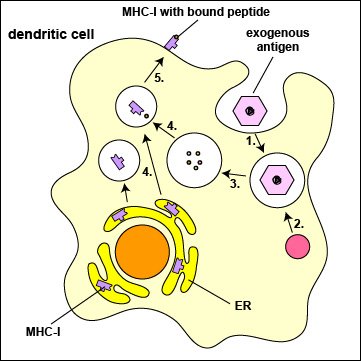
Exogenous antigens can be cross-presented to MHC-I molecules by certain dendritic cells. One proposed mechanism is via the direct transfer of peptides from the phagolysosome into the vesicles containing the MHC-I molecules in the dendritic cell.
1. An exogenous antigen is engulfed and placed in a phagosome.
2. After a lysosome fuses with the phagosome forming a phagolysosome.
3. Proteins from the exogenous antigen are degraded by lysosomal proteases into peptides.
4. The peptides are directly transfered from the phagolysosome to the vesicles containing the MHC-I molecules.
5 . The MHC-I molecules with bound peptides are then transported to the surface of the dendritic cell where they can be presented to naive T8-lymphocytes.
Last updated: August, 2019
Please send comments and inquiries to Dr.
Gary Kaiser